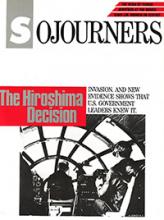As the deadline for this issue of Sojourners approaches, the subject of terrorism is very much with us. The tragedy of the hijacked TWA flight 847 has just ended, and talk of U.S. retaliation is in the air. The TWA hijacking is only the most recent in a series of bombings, kidnappings, and other crimes aimed at U.S. citizens and institutions in the Middle East. And it is unlikely to be the last.
These incidents are all morally inexcusable and cruelly tragic for the individuals and families involved. The TWA hijacking was especially despicable both for the point-blank murder of an American sailor and for the ominous racism displayed in separating out passengers with "Jewish-sounding names." But such incidents also have implications for U.S. foreign policy that are being lost in the current fury over terrorism.
Read the Full Article

